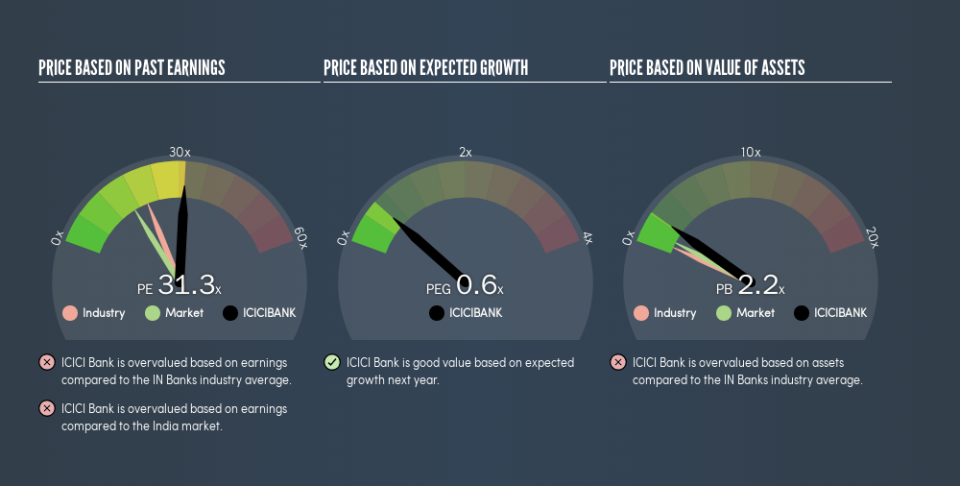What Does ICICI Bank Limited’s (NSE:ICICIBANK) P/E Ratio Tell You?

The goal of this article is to teach you how to use price to earnings ratios (P/E ratios). We’ll show how you can use ICICI Bank Limited’s (NSE:ICICIBANK) P/E ratio to inform your assessment of the investment opportunity. Based on the last twelve months, ICICI Bank’s P/E ratio is 31.27. That corresponds to an earnings yield of approximately 3.2%.
Check out our latest analysis for ICICI Bank
How Do You Calculate ICICI Bank’s P/E Ratio?
The formula for price to earnings is:
Price to Earnings Ratio = Share Price ÷ Earnings per Share (EPS)
Or for ICICI Bank:
P/E of 31.27 = ₹375.85 ÷ ₹12.02 (Based on the year to December 2018.)
Is A High Price-to-Earnings Ratio Good?
A higher P/E ratio implies that investors pay a higher price for the earning power of the business. That isn’t a good or a bad thing on its own, but a high P/E means that buyers have a higher opinion of the business’s prospects, relative to stocks with a lower P/E.
How Growth Rates Impact P/E Ratios
P/E ratios primarily reflect market expectations around earnings growth rates. When earnings grow, the ‘E’ increases, over time. That means even if the current P/E is high, it will reduce over time if the share price stays flat. A lower P/E should indicate the stock is cheap relative to others — and that may attract buyers.
ICICI Bank shrunk earnings per share by 24% over the last year. And over the longer term (5 years) earnings per share have decreased 8.8% annually. This could justify a pessimistic P/E.
How Does ICICI Bank’s P/E Ratio Compare To Its Peers?
The P/E ratio indicates whether the market has higher or lower expectations of a company. You can see in the image below that the average P/E (20.6) for companies in the banks industry is lower than ICICI Bank’s P/E.
That means that the market expects ICICI Bank will outperform other companies in its industry. Clearly the market expects growth, but it isn’t guaranteed. So investors should delve deeper. I like to check if company insiders have been buying or selling.
A Limitation: P/E Ratios Ignore Debt and Cash In The Bank
Don’t forget that the P/E ratio considers market capitalization. In other words, it does not consider any debt or cash that the company may have on the balance sheet. In theory, a company can lower its future P/E ratio by using cash or debt to invest in growth.
Spending on growth might be good or bad a few years later, but the point is that the P/E ratio does not account for the option (or lack thereof).
ICICI Bank’s Balance Sheet
ICICI Bank’s net debt is 59% of its market cap. This is enough debt that you’d have to make some adjustments before using the P/E ratio to compare it to a company with net cash.
The Verdict On ICICI Bank’s P/E Ratio
ICICI Bank has a P/E of 31.3. That’s higher than the average in the IN market, which is 16.5. With meaningful debt and a lack of recent earnings growth, the market has high expectations that the business will earn more in the future.
Investors have an opportunity when market expectations about a stock are wrong. As value investor Benjamin Graham famously said, ‘In the short run, the market is a voting machine but in the long run, it is a weighing machine.’ So this free visual report on analyst forecasts could hold the key to an excellent investment decision.
Of course, you might find a fantastic investment by looking at a few good candidates. So take a peek at this free list of companies with modest (or no) debt, trading on a P/E below 20.
We aim to bring you long-term focused research analysis driven by fundamental data. Note that our analysis may not factor in the latest price-sensitive company announcements or qualitative material.
If you spot an error that warrants correction, please contact the editor at editorial-team@simplywallst.com. This article by Simply Wall St is general in nature. It does not constitute a recommendation to buy or sell any stock, and does not take account of your objectives, or your financial situation. Simply Wall St has no position in the stocks mentioned. Thank you for reading.

